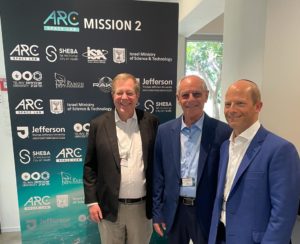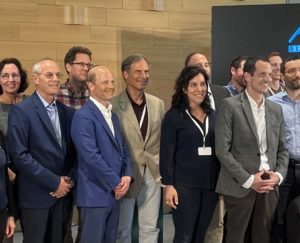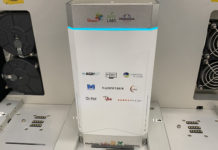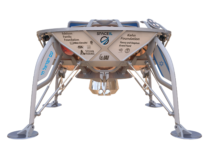
Two Jewish doctors affiliated with Thomas Jefferson University, Zvi Grunwald and Adam Dicker, will have their experiments conducted in outer space as part of a mission to the International Space Station.
In April, Israeli astronaut Eytan Stibbe of the ISS will blast off to space in a mission “in concert with NASA,” according to TJU content specialist Brian Hickey. Grunwald and Dicker will not go with him, but their experiments will.
Dicker’s study will look at how space travel impacts immune functions, often negatively. Grunwald helped facilitate Dicker’s experiment as well as two others submitted by Thomas Jefferson doctors, focusing on “how gravity and the space station environment might change an astronaut’s urinary microbiome” and monitoring “stress and sleep while testing stress interventions in novice space travelers,” according to a news release from Jefferson.
The Ramon Foundation and the Israeli Space Agency are leading the mission to the ISS.
“Now we can be part of this history unfolding in front of our eyes,” Grunwald said. “You participate in a scientific endeavor that might affect future astronauts and the quality of life on earth.”
The launch started coming together in 2017 when TJU sponsored a Philadelphia Orchestra tour in Israel, according to Dr. Mark Tykocinski, the executive vice president of academic affairs at TJU.
The university used that tour to launch its Jefferson Israel Center, which established relationships with academic medical centers in the Jewish state, including the Sheba Medical Center, a collaborator with TJU on the experiments submitted to the ISS mission.
Out of that relationship, according to Tykocinski, came the connection to the Israeli Space Agency and the opportunity to contribute studies to this Israel-organized space trip. It’s the first private mission to the ISS, Tykocinski said.
“We’ve been taking Jefferson global,” he added of the expansion to Israel. “Now we’re going beyond the globe.”
The launch gave the TJU doctors the rare opportunity to develop experiments for a journey to space.
When building an experiment, Dicker, the chair of radiation and oncology at TJU, said, “You first have to find an unmet need.”
In partnership with Dr. Yaacov Lawrence of the Sheba Medical Center, who came up with the idea, Dicker developed a way to study the question of why traveling to space can lead to immune dysfunction.
After returning from space, astronauts are often prone to viral infections, rashes and a “whole host of other things,” Dicker said. They often come back shorter and weaker, too.
“The immune system is an important topic for those of us in oncology,” he added.
In examining the issue before the launch, the doctors learned that there was little known about it. So to study it, they took pre-samples from astronauts and will take post-samples from them, too.
“We’ll see where we are and go from there,” Dicker said.
Dicker believes it’s important to ask the question because commercial space travel is a growing industry.
“There are things that space travel does that aren’t positive,” he said. “There are a lot of things related to human disease and aging that we’ll learn.”
Grunwald thinks the other experiments from Jefferson are important as well.
“We know very little about the microbiome of the urine” as it relates to space travel, the doctor said. And traveling beyond the Earth is a stressful experience, Grunwald explained. It can impact vital signs, sleep physiology and cognitive psychology.
“We have to plan how to mitigate and improve the experience to prevent adverse emotional events during space travel,” the doctor added.
This is essential to a successful space mission, according to Grunwald.
He compared astronauts to Olympic athletes, whose emotions are often as much of a factor in their results as their physical builds.
“The impact of emotion on human performance is enormous,” Grunwald said.

But beyond the importance of their experiments, the doctors think that it’s cool that their work will be done in space.
“All my life I was anticipating, and I never dreamed that this moment would come,” Grunwald said.
“This is a big deal,” Dicker added.
It’s also a big deal for Philadelphia-based TJU.
The school will celebrate its 200th anniversary in 2024, and what started as the nation’s fifth medical school is now, after a 2017 merger with Philadelphia University, a multi-faceted institution with more than 40,000 employees and $9 billion in revenue per year, according to Tykocinski.
“This is an exciting new Jefferson,” he said. “We’re a major national research university. But now we’re talking about being a major global research university.”
“This space mission captures all that,” he said. JE






